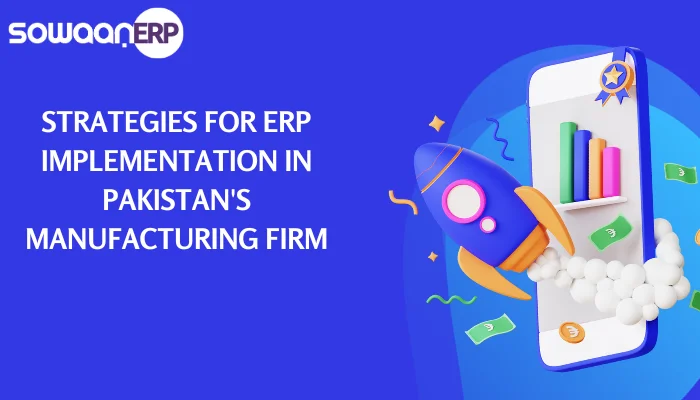
The manufacturing firm sector is increasingly turning to ERP software for businesses in Pakistan. The adoption of this technology is key to streamlining processes and enhancing productivity across diverse industries. Benefits of ERP in manufacturing industry Pakistan are numerous, however, there are some strategies to implement it.
How to implement ERP in manufacturing industry?
Here are some strategies to implement ERP manufacturing software in Pakistan.
Strategy 1: Understanding your business needs
Understanding your business needs is the first and most crucial step in implementing an ERP system. This involves a thorough analysis of your current operations, processes, and objectives. It’s important to identify gaps and inefficiencies that the ERP system can address. This step also helps you set clear goals for what you want to achieve with the ERP implementation.
Strategy 2: Selecting the right ERP solution
Choosing the right ERP solution is not just about features and price. It’s about finding a system that aligns with your business goals, can scale with your growth, offers customization to fit your unique processes, and provides robust support services. Researching and comparing different solutions will help you make an informed decision.
Strategy 3: Developing an implementation plan
Developing a detailed implementation plan is key to successful ERP deployment. The plan should outline the steps, responsibilities, timelines, and resources needed. It should also include risk management strategies and contingency plans to handle any potential challenges that may arise during the implementation process.
Strategy 4: Training the Staff
Training the staff is an integral part of ERP implementation. It’s essential to ensure that all users understand how to use the new system effectively. This includes training on specific functions relevant to their roles and providing ongoing support as they adapt to the new system.
Strategy 5: Data migration
Data migration involves transferring data from old systems to the new ERP system. It’s a critical process that requires careful planning and execution to ensure data accuracy and integrity. It’s also important to consider data privacy and security during this process.
Strategy 6: System testing
System testing allows you to identify and fix any issues before the system goes live. This includes functional testing to verify that all features work as expected, performance testing to ensure the system can handle the required load, and security testing to detect any vulnerabilities.
Strategy 7: GoinglLive
The ‘go-live’ phase is when the ERP system is officially put into operation. It’s recommended to start with a phased approach, where the system is rolled out gradually to different departments or locations. This allows for any last-minute issues to be resolved without disrupting the entire organization.
Strategy 8: Continuous support and maintenance
Once the system is live, continuous support and maintenance are needed to ensure its smooth operation. This includes troubleshooting any issues that arise, making necessary updates or modifications, and providing user support. Regular system audits can also help identify areas for improvement.
Strategy 9: Regular updates
Keeping the ERP system updated is critical for maintaining its efficiency and security. Regular updates provide new features, improvements, and security patches. It’s important to plan and manage these updates carefully to minimize disruption to business operations.
Strategy 10: Review and improvement
Regular reviews of the ERP system’s performance against the set objectives are crucial for continuous improvement. These reviews can help identify areas where the system is not delivering as expected, leading to targeted enhancements. Feedback from users can also provide valuable insights for improvement.
SowaanERP: The best ERP solution provider
SowaanERP is a leading provider of ERP software for businesses in Pakistan. They offer a robust and comprehensive solution tailored to meet the unique needs of manufacturing firms in the country.
Customized solutions for unique needs
SowaanERP understands that each manufacturing firm has its own specific needs and challenges. That’s why they offer customized ERP solutions that perfectly fit businesses’ unique operational requirements.
User-friendly interface
Ease of use is a major focus of SowaanERP. They also provide a user-friendly interface that makes it easy for employees at all levels to navigate and use the system effectively.
Exceptional support services
When you buy ERP manufacturing software from SowaanERP, you’re not just purchasing a product; you’re investing in a partnership. They provide exceptional support services to ensure smooth implementation and operation.
Continuous innovation
SowaanERP believes in continuous innovation. They also regularly update their ERP solutions, incorporating the latest technological advancements to provide businesses with a competitive edge.
Proven track record
With a proven track record in the industry, SowaanERP is a trusted partner for many manufacturing firms in Pakistan. Their clients attest to the significant improvements in efficiency and productivity after implementing their ERP solutions.
To sum up, if you’re evaluating ERP solutions for manufacturing in Pakistan, SowaanERP should be at the top of your list. Their commitment to customer satisfaction, innovation, and support makes them an ideal choice for any manufacturing firm looking to reap the benefits of ERP.
Conclusion
Implementing ERP manufacturing in Pakistan can bring significant benefits. However, it requires careful planning, selection, and execution. With these strategies, businesses can ensure a successful ERP implementation, enhancing efficiency, productivity, and overall business performance. By deciding to buy ERP manufacturing software in Pakistan, companies can reap the benefits of ERP in the manufacturing industry.
Moreover, ERP systems can help streamline operations and improve decision-making processes by providing real-time data. This can lead to improved customer satisfaction as well as increased profitability. Furthermore, ERP systems can also foster collaboration across different departments, breaking down silos and promoting a more cohesive work environment. Lastly, with the right ERP system, businesses can better manage their resources, reduce waste, and drive sustainability efforts. Investing in ERP software is not just a technological upgrade, but a strategic move that can propel a manufacturing firm towards long-term success.
